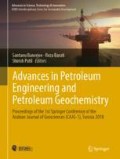Abstract
Analyzing the sensitivity of high and low salinity, according to the moderately low recovery factor of high and low salinity among injection scenarios, illustrates the low sensitivity of this parameter in a fractured carbonated reservoir. By reviewing different scenarios, it could be demonstrated that if water injection was being applied to the reservoir from the preliminary times of production, the recovery factor rate will increase. Pure water injection has a high recovery factor than salty water injection. By the way, these two methods have a little difference in their recovery calculating methods. Moreover, in water injection methods, if the injection rate of water increases, the recovery factor will increase and give rise to a higher efficiency. Besides, this parameter is significantly dependent on well-head equipment properties, safety factors and economic issues (water production). Analyzing the figures and the volumes of low salinity water injection after the injection of pure water in different injection scenarios showed that all these scenarios have the highest rate of recovery and the maximum production efficiency.
Access this chapter
Tax calculation will be finalised at checkout
Purchases are for personal use only
References
Zeinijahromi, A., Ahmetgareev, V., Ibatullin, R., Bedrikovetsky, P.: Sensitivity study of low salinity water injection in Zichebashskoe oilfield. J. Petrol. Gas Eng. 6(1), 10–21 (2015)
Al-Shalabi, E.W., Sepehrnoori, K.: A comprehensive review of low salinity/engineered water injections and their applications in sandstone and carbonate rocks. J. Petrol. Sci. Eng. 139, 137–161 (2016)
Teklu, T.W., Alameri, W., Graves, R.M., Kazemi, H., AlSumaiti, A.M.: Low-salinity water-alternating-CO2 EOR. J. Petrol. Sci. Eng. 142, 101–118 (2016)
Davarpanah, A., Zarei, M.: Analysis of enhanced oil recovery methods like gas injection in the fractured reservoirs and optimize its efficiency. J. Mater. Sci. Eng. 6 (2017)
Dang, C., Nghiem, L., Nguyen, N., Chen, Z., Nguyen, Q.: Mechanistic modeling of low salinity water flooding. J. Petrol. Sci. Eng. 146, 191–209 (2016)
Davarpanah, A.: Evaluation of gas injection in the horizontal wells and optimizing oil recovery factor by Eclipse software. J. Chromatogr. Sep. Tech. 7 (2016)
Author information
Authors and Affiliations
Corresponding author
Editor information
Editors and Affiliations
Rights and permissions
Copyright information
© 2019 Springer Nature Switzerland AG
About this paper
Cite this paper
Davarpanah, A. (2019). Experimental Investigation of Low and High Salinity Water Injection Simulation and Their Comparison with Pure Water Injection to Determine Optimum Salinity. In: Banerjee, S., Barati, R., Patil, S. (eds) Advances in Petroleum Engineering and Petroleum Geochemistry. CAJG 2018. Advances in Science, Technology & Innovation. Springer, Cham. https://doi.org/10.1007/978-3-030-01578-7_10
Download citation
DOI: https://doi.org/10.1007/978-3-030-01578-7_10
Published:
Publisher Name: Springer, Cham
Print ISBN: 978-3-030-01577-0
Online ISBN: 978-3-030-01578-7
eBook Packages: Earth and Environmental ScienceEarth and Environmental Science (R0)

